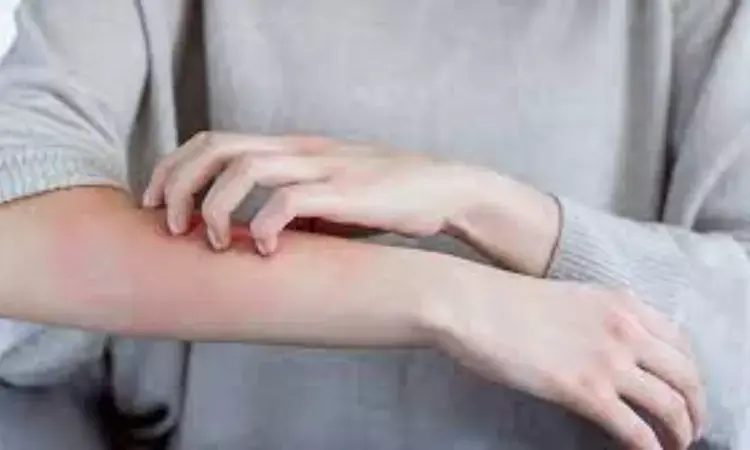- Home
- Medical news & Guidelines
- Anesthesiology
- Cardiology and CTVS
- Critical Care
- Dentistry
- Dermatology
- Diabetes and Endocrinology
- ENT
- Gastroenterology
- Medicine
- Nephrology
- Neurology
- Obstretics-Gynaecology
- Oncology
- Ophthalmology
- Orthopaedics
- Pediatrics-Neonatology
- Psychiatry
- Pulmonology
- Radiology
- Surgery
- Urology
- Laboratory Medicine
- Diet
- Nursing
- Paramedical
- Physiotherapy
- Health news
- Fact Check
- Bone Health Fact Check
- Brain Health Fact Check
- Cancer Related Fact Check
- Child Care Fact Check
- Dental and oral health fact check
- Diabetes and metabolic health fact check
- Diet and Nutrition Fact Check
- Eye and ENT Care Fact Check
- Fitness fact check
- Gut health fact check
- Heart health fact check
- Kidney health fact check
- Medical education fact check
- Men's health fact check
- Respiratory fact check
- Skin and hair care fact check
- Vaccine and Immunization fact check
- Women's health fact check
- AYUSH
- State News
- Andaman and Nicobar Islands
- Andhra Pradesh
- Arunachal Pradesh
- Assam
- Bihar
- Chandigarh
- Chattisgarh
- Dadra and Nagar Haveli
- Daman and Diu
- Delhi
- Goa
- Gujarat
- Haryana
- Himachal Pradesh
- Jammu & Kashmir
- Jharkhand
- Karnataka
- Kerala
- Ladakh
- Lakshadweep
- Madhya Pradesh
- Maharashtra
- Manipur
- Meghalaya
- Mizoram
- Nagaland
- Odisha
- Puducherry
- Punjab
- Rajasthan
- Sikkim
- Tamil Nadu
- Telangana
- Tripura
- Uttar Pradesh
- Uttrakhand
- West Bengal
- Medical Education
- Industry
Memantine effective for Trichotillomania and skin-picking disorder

Memantine therapy had a reasonably high effectiveness and was well tolerated in individuals with Trichotillomania and skin-picking condition, says an article published in the American Journal of Psychiatry.
Underrecognized and frequently crippling disorders like trichotillomania and skin-picking disorder cause people to pluck or pick at their skin or hair repeatedly, causing obvious hair loss or tissue damage. There are very few evidence-based therapies available for these illnesses as of right now. Jon Grant and crew conducted this study to see if memantine, a glutamate modulator, may reduce hair pulling and skin picking better than a placebo.
In a double-blind study with memantine (dosing range, 10-20 mg/day) or placebo for 8 weeks, 100 persons with trichotillomania or skin-picking disorder (86 women; mean age, 31.4 years [SD=10.2]) were included. Measures of the intensity of the tugging and plucking were used to evaluate the participants. An analysis of the outcomes was done using a linear mixed-effects model. The NIMH Trichotillomania Symptom Severity Scale was amended to include skin picking as the major outcome measure, and treatment-related improvement on this scale represented success.
The key findings of this study were :
Regarding treatment-by-time interactions, memantine therapy was linked to significantly better scores than placebo on the NIMH scale, Sheehan Disability Scale, and Clinical Global Impressions severity scale.
At the study's conclusion, 60.5% of memantine group participants were "much or very much improved," as opposed to 8.3% of placebo group participants (number required to treat=1.9).
The treatment arms did not substantially vary in adverse events.
This study discovered that memantine medication was well tolerated, had a relatively high effectiveness (based on number needed to treat), and reduced hair pulling and skin-picking symptoms statistically significantly more than placebo. It could be advantageous to focus on the glutamate system while treating obsessive behaviors.
Reference:
Grant, J. E., Chesivoir, E., Valle, S., Ehsan, D., & Chamberlain, S. R. (2023). Double-Blind Placebo-Controlled Study of Memantine in Trichotillomania and Skin-Picking Disorder. In American Journal of Psychiatry (Vol. 180, Issue 5, pp. 348–356). American Psychiatric Association Publishing. https://doi.org/10.1176/appi.ajp.20220737
Neuroscience Masters graduate
Jacinthlyn Sylvia, a Neuroscience Master's graduate from Chennai has worked extensively in deciphering the neurobiology of cognition and motor control in aging. She also has spread-out exposure to Neurosurgery from her Bachelor’s. She is currently involved in active Neuro-Oncology research. She is an upcoming neuroscientist with a fiery passion for writing. Her news cover at Medical Dialogues feature recent discoveries and updates from the healthcare and biomedical research fields. She can be reached at editorial@medicaldialogues.in
Dr Kamal Kant Kohli-MBBS, DTCD- a chest specialist with more than 30 years of practice and a flair for writing clinical articles, Dr Kamal Kant Kohli joined Medical Dialogues as a Chief Editor of Medical News. Besides writing articles, as an editor, he proofreads and verifies all the medical content published on Medical Dialogues including those coming from journals, studies,medical conferences,guidelines etc. Email: drkohli@medicaldialogues.in. Contact no. 011-43720751


